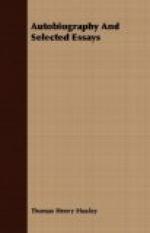No parts of the Life and Letters are more enjoyable than those concerning the “Happy Family,” as a friend of Huxley’s names his household. His family of seven children found their father a most engaging friend and companion. He could tell them wonderful sea stories and animal stories and could draw fascinating pictures. His son writes of how when he was ill with scarlet fever he used to look forward to his father’s home-coming. “The solitary days—for I was the first victim in the family—were very long, and I looked forward with intense interest to one half-hour after dinner, when he would come up and draw scenes from the history of a remarkable bull-terrier and his family that went to the seaside in a most human and child-delighting manner. I have seldom suffered a greater disappointment than when, one evening, I fell asleep just before this fairy half-hour, and lost it out of my life.”
The account of the comradeship between Huxley and his wife reads like a good old-time romance. He was attracted to her at first by her “simplicity and directness united with an unusual degree of cultivation,” Huxley’s son writes. On her he depended for advice in his work, and for companionship at home and abroad when wandering in search of health in Italy and Switzerland. When he had been separated from her for some time, he wrote, “Nobody, children or anyone else, can be to me what you are. Ulysses preferred his old woman to immortality, and this absence has led me to see that he was as wise in that as in other things.” Again he writes, “Against all trouble (and I have had my share) I weigh a wife-comrade ‘trew and fest’ in all emergencies.”
The letters also give one a clear idea of the breadth of Huxley’s interests, particularly of his appreciation of the various forms of art. Huxley believed strongly in the arts as a refining and helpful influence in education. He keenly enjoyed good music. Professor Hewes writes of him that one breaking in upon him in the afternoon at South Kensington would not infrequently be met “with a snatch of some melody of Bach’s fugue.” He also liked good pictures, and always had among his friends well-known artists, as Alma-Tadema, Sir Frederick Leighton, and Burne-Jones. He read poetry widely, and strongly advocated the teaching of poetry in English schools. As to poetry, his own preferences are interesting. Wordsworth he considered too discursive; Shelley was too diffuse; Keats, he liked for pure beauty, Browning for strength, and Tennyson for his understanding of modern science; but most frequently of all he read Milton and Shakespeare.




